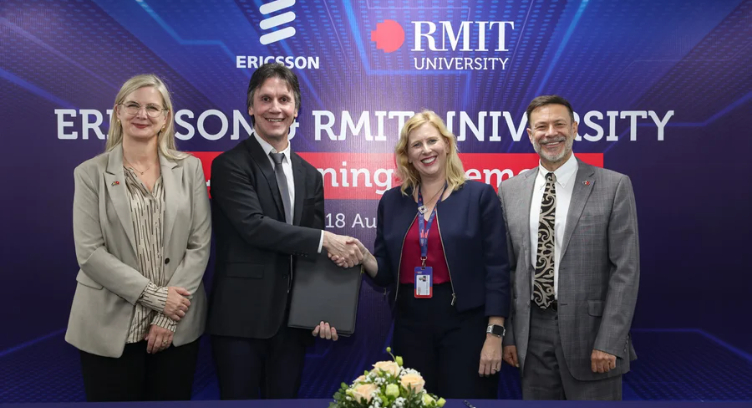Ericsson and RMIT University signed in the presence of the Swedish and Australian Ambassadors to Vietnam an agreement to launch the RMIT & Ericsson AI Lab at RMIT's campus in Hanoi.
The joint AI Lab initiative is an extension of the existing 5G education collaboration between RMIT and Ericsson that helps educate Vietnamese students on 5G and emerging technologies, such as AI, machine learning, blockchain, cloud computing, AR/VR and automation, enabling RMIT science, technology and engineering students to actively participate and contribute to the country’s digital economy and Industry 4.0 digital transformation journey.
The AI Lab partnership is also an industrial research and education initiative focusing on the application of artificial intelligence to Industry 4.0 initiatives enabled by the roll out of 5G in Vietnam. Through this initiative, Ericsson and RMIT will support industry, academia and community partners to create and implement AI solutions that will spearhead the adoption of Industry 4.0 across a multitude of industries, including energy, manufacturing, agriculture, transport and logistics.
With the rapid development of technological advancements that drive increased efficiency and productivity across traditionally labor intensive industries, coupled with the shift of social focus to environmentally sustainable development, the need for digitally enabled skills and capabilities in the workforce has become an escalating priority for nations across the globe. In Vietnam, the Government has targeted clear objectives to accelerate the adoption of Industry 4.0 as part of its National Strategy for Digital Transformation.
The AI Lab collaboration activities are expected to include work integrated training/learning in 5G, AI/ML, AR/VR, automation, cloud & edge computing, blockchain and related technologies, coupled with the ambition to jointly research, create and implement AI applications that can serve the needs of industries across Vietnam, such as manufacturing, energy, education, transport and logistics. In addition, the AI Lab will enable Ericsson and RMIT to connect with community partners over time to potentially create a broader ecosystem in the fields of Artificial Intelligence and communications technology, leveraging 5G as a critical national infrastructure.
It will contribute to further advancing the start-up and innovation ecosystem across the nation, whilst also nurturing and developing the high-tech human capital capabilities of the workforce of the future.
The 5G-ready young talent and AI applications that this collaboration expects to produce will serve to accelerate Vietnam’s Industry 4.0 agenda, as well as its ambition to become an AI hub in ASEAN by 2030. Indeed, it will drive and create the next wave of sustained and inclusive socio-economic development in Vietnam, enabled by science, technology and innovation.”
Our links into industry, such as this growing partnership with Ericsson, ensure graduates have the practical skills necessary to succeed in fast-evolving business environments, filling emerging skills gaps and assisting Vietnam’s transition to a value-added economy”.
Ericsson is a global leader in 5G and is currently running 147 live 5G networks in 63 countries across the globe.
Denis Brunetti, Head of Ericsson Vietnam, Myanmar, Cambodia and Laos
This AI Lab builds on the previously launched 5G education collaboration with RMIT in Vietnam and represents a significant step in building a high-tech industry-ready workforce in Vietnam through strategic industry-academia partnerships, whilst helping further advance the start-up and innovation ecosystem across the nation.
Professor Claire Macken, Pro Vice-Chancellor and General Director of RMIT Vietnam
As part of our strategic focus, RMIT aims to contribute to an overall uplift of technological capabilities for Vietnam to be positioned in digital industries, and the future of digital transformation.






















